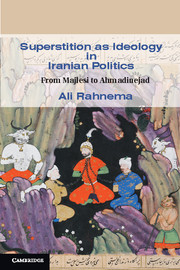Book contents
- Frontmatter
- Contents
- Preface and Acknowledgements
- Introduction
- Part I POLITICIZING OCCULT ISLAM
- Part II POPULAR SHIʿISM
- 4 Milieu, Childhood, Sanctity and Fame
- 5 From Conceptualization to Officialization of a Religio-political Ideology
- 6 Deficiency and Defectiveness of the Human Mind
- 7 Society Needs the Leadership of Jurists and/or Kings
- 8 Superstitious Education
- 9 Reconfigurating the Necessities of Belief
- 10 Majlesism as an Ideology
- Conclusion
- Bibliography
- Index
- List of Books in the Series
6 - Deficiency and Defectiveness of the Human Mind
Published online by Cambridge University Press: 05 June 2012
- Frontmatter
- Contents
- Preface and Acknowledgements
- Introduction
- Part I POLITICIZING OCCULT ISLAM
- Part II POPULAR SHIʿISM
- 4 Milieu, Childhood, Sanctity and Fame
- 5 From Conceptualization to Officialization of a Religio-political Ideology
- 6 Deficiency and Defectiveness of the Human Mind
- 7 Society Needs the Leadership of Jurists and/or Kings
- 8 Superstitious Education
- 9 Reconfigurating the Necessities of Belief
- 10 Majlesism as an Ideology
- Conclusion
- Bibliography
- Index
- List of Books in the Series
Summary
The intellectual incapacity and feeble-mindedness of the common folk constituting the Muslim community (ommat) is a theme that permeates the writings of Majlesi. For Majlesi, in the final analysis, the human mind is defective and incapable of discerning the proper path to felicity and discovering the truth. Majlesi's repeated assertion that humans have a deficient mind needs to be understood in the context of his belief that the reports of the imams are the absolute repository of all knowledge and certitudes. As long as human reasoning confirms and validates such reports, be they on independent topics or pertaining to interpretations of Qur'anic verses and injunctions, Majlesi honours and respects the mental and rational capacity of humans. Once doubt creeps in, questions are raised and alternative explanations to the Majlesi-approved constructions and understandings are advanced, he unequivocally categorizes such exercises as futile outcomes of deficient minds. Majlesi refers to a report attributed to an imam to support his own position and demonstrate the deficiency of human reasoning. He argues that those who do not receive revelations and who God has not designated as leaders to whom obedience is compulsory are not in a position to speak on religious issues, for if they do, it would imply that they have considered themselves as partners to God. Majlesi later includes the scholars of reports in the circle of those who are entitled to speak on religious issues.
- Type
- Chapter
- Information
- Superstition as Ideology in Iranian PoliticsFrom Majlesi to Ahmadinejad, pp. 200 - 218Publisher: Cambridge University PressPrint publication year: 2011



